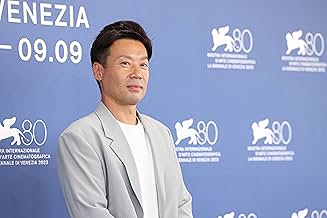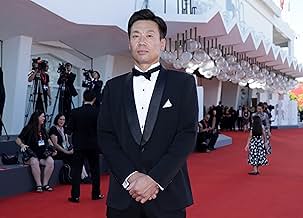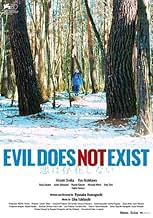Takumi e a filha Hana moram na vila de Mizubiki, perto de Tóquio. Um dia, os habitantes da vila tomam conhecimento de um plano para construir um retiro perto da casa de Takumi, oferecendo ao... Ler tudoTakumi e a filha Hana moram na vila de Mizubiki, perto de Tóquio. Um dia, os habitantes da vila tomam conhecimento de um plano para construir um retiro perto da casa de Takumi, oferecendo aos moradores uma fuga confortável para a natureza.Takumi e a filha Hana moram na vila de Mizubiki, perto de Tóquio. Um dia, os habitantes da vila tomam conhecimento de um plano para construir um retiro perto da casa de Takumi, oferecendo aos moradores uma fuga confortável para a natureza.
- Direção
- Roteiristas
- Artistas
- Prêmios
- 17 vitórias e 45 indicações no total
Avaliações em destaque
Ryusuke Hamaguchi has made some interesting movies in his career like Drive My Car, Happy Hour, and Asako I & II. While I haven't been wowed by his works, I appreciate many aspects of his style and approach.
Throughout, this movie has some wonderful colorful productions, camerawork, sound designs and atmosphere which helped add layers of the nature landscapes and environment. The narrative provides some interesting themes of nature, conflict of interest, humans and humans vs. Nature issues and explores some interesting aspects that are strong. The performances are all pretty good as well.
However, I am a bit underwhelmed with certain aspects as I found some of the themes feeling a little uneven to work Hamaguchi is wanting to express. Especially when it comes to the characters as while I did found some of the characters interesting, I didn't feel too emotionally connected with their personalities and purpose which made it a bit difficult to fully invest at times.
The soundtrack is wonderful and the dialogue is solid. The film does suffer some pacing issues and with an ending that leaves to many interpretations which may be frustrating for some. Overall, despite it's flaws, it's mediative and nature experience made this movie pretty good.
Throughout, this movie has some wonderful colorful productions, camerawork, sound designs and atmosphere which helped add layers of the nature landscapes and environment. The narrative provides some interesting themes of nature, conflict of interest, humans and humans vs. Nature issues and explores some interesting aspects that are strong. The performances are all pretty good as well.
However, I am a bit underwhelmed with certain aspects as I found some of the themes feeling a little uneven to work Hamaguchi is wanting to express. Especially when it comes to the characters as while I did found some of the characters interesting, I didn't feel too emotionally connected with their personalities and purpose which made it a bit difficult to fully invest at times.
The soundtrack is wonderful and the dialogue is solid. The film does suffer some pacing issues and with an ending that leaves to many interpretations which may be frustrating for some. Overall, despite it's flaws, it's mediative and nature experience made this movie pretty good.
The opening shot is mesmerising, disorientating, as Yoshio Kitagawa's camera pans under the tree tops to Eiko Ishibashi's haunting score. The start of Ryusuke Hamaguchi's "Evil Does Not Exist" reminds of Bela Tarr's "Satantango" (1994), with a slow-moving, natural, extended take. Not as extreme, but it sets the tone for what comes next.
Mizubiki village is a quiet mountain town a manageable drive from Tokyo. A minor holiday destination, investors want to set-up a glamping site, which naturally meets resistance from the locals. Takumi (Hitoshi Omika), a local odd-job man is cautious, but willing to meet the proposals halfway if they take the local environment into consideration.
Takahashi (Ryuji Kosaka) and Mayuzumi (Ayaka Shibutani) are the employees tasked with meeting the locals and convincing them of the project. Sympathetic to their hosts, they are people doing a job they don't necessarily believe in, and so are neither one thing or the other. Seeming to connect with Takumi, they feel a solution can be reached, but the reality is they are met with contempt from both sides.
Straightaway this enraptures you and you are immediately drawn into the small village and its humble ways. The brilliance of nature is emphasised throughout, and the opening moments show this perfectly. And as Takahashi and Mayuzumi try to deliver the initial presentation, key members of the community voice the importance of the environment on their health, community, work and business.
The last of these is the only focus the glamping project has in mind, thinking of the pretty landscape, and not the impact a modern resort will have on it. As Alex Kerr emphasises in his book "Hidden Japan," once you have been somewhere, you've already ruined it. The village elder (Taijiro Tamura) puts his point across succinctly: those living upstream must think of their impact on those downstream.
Often, I've found Hamaguchi's films, while good, can feel a little awkward. Characters and their interactions can feel wooden (perhaps due to his use of novice actors) and their motivations hard to grasp. "Drive My Car" (2021) was a step-up for him, and "Evil Does Not Exist" is by far his strongest in its script. It feels tighter, with arguments better put forward, in both the initial presentation and Takahashi and Mayuzumi's drive back to the village, where they share their career decisions. It is much more natural, though Takahashi's sudden desire to change careers may be a bit much for some.
Takumi's daughter Hana (Ryo Nishikawa) is a key character, but perhaps from the standard use of a young girl to represent pure innocence. The true star of the film is the forest of its setting and the film's true lasting memory, working in unison with the soundtrack.
The title of the film is enigmatic, as is the atmosphere throughout. The isolation of the forest community, and their connection to nature, show an innocence. But clear in their desires, they show they will fight to keep what's theirs. Takahashi and Mayuzumi may be the face of the more sinister corporate body behind them, but also show themselves to be useless pawns, simply carrying out their job.
Is simple self-sufficiency more noble than misguidedly following orders from above for profits? The ending confuses this question, its incompleteness difficult to process. The real question is whether it is better to do bad to protect what you believe in, rather than trying to diplomatically do something you don't believe in out of expectation. Silence is complicit.
The forest is deep, and it's easy to lose yourself.
Politic1983.home.blog.
Mizubiki village is a quiet mountain town a manageable drive from Tokyo. A minor holiday destination, investors want to set-up a glamping site, which naturally meets resistance from the locals. Takumi (Hitoshi Omika), a local odd-job man is cautious, but willing to meet the proposals halfway if they take the local environment into consideration.
Takahashi (Ryuji Kosaka) and Mayuzumi (Ayaka Shibutani) are the employees tasked with meeting the locals and convincing them of the project. Sympathetic to their hosts, they are people doing a job they don't necessarily believe in, and so are neither one thing or the other. Seeming to connect with Takumi, they feel a solution can be reached, but the reality is they are met with contempt from both sides.
Straightaway this enraptures you and you are immediately drawn into the small village and its humble ways. The brilliance of nature is emphasised throughout, and the opening moments show this perfectly. And as Takahashi and Mayuzumi try to deliver the initial presentation, key members of the community voice the importance of the environment on their health, community, work and business.
The last of these is the only focus the glamping project has in mind, thinking of the pretty landscape, and not the impact a modern resort will have on it. As Alex Kerr emphasises in his book "Hidden Japan," once you have been somewhere, you've already ruined it. The village elder (Taijiro Tamura) puts his point across succinctly: those living upstream must think of their impact on those downstream.
Often, I've found Hamaguchi's films, while good, can feel a little awkward. Characters and their interactions can feel wooden (perhaps due to his use of novice actors) and their motivations hard to grasp. "Drive My Car" (2021) was a step-up for him, and "Evil Does Not Exist" is by far his strongest in its script. It feels tighter, with arguments better put forward, in both the initial presentation and Takahashi and Mayuzumi's drive back to the village, where they share their career decisions. It is much more natural, though Takahashi's sudden desire to change careers may be a bit much for some.
Takumi's daughter Hana (Ryo Nishikawa) is a key character, but perhaps from the standard use of a young girl to represent pure innocence. The true star of the film is the forest of its setting and the film's true lasting memory, working in unison with the soundtrack.
The title of the film is enigmatic, as is the atmosphere throughout. The isolation of the forest community, and their connection to nature, show an innocence. But clear in their desires, they show they will fight to keep what's theirs. Takahashi and Mayuzumi may be the face of the more sinister corporate body behind them, but also show themselves to be useless pawns, simply carrying out their job.
Is simple self-sufficiency more noble than misguidedly following orders from above for profits? The ending confuses this question, its incompleteness difficult to process. The real question is whether it is better to do bad to protect what you believe in, rather than trying to diplomatically do something you don't believe in out of expectation. Silence is complicit.
The forest is deep, and it's easy to lose yourself.
Politic1983.home.blog.
This film was supposed to be a 30 minute cinematic accompaniment to a score that the director's friend made, only that during the collection of video material Hamaguchi had this story idea and made a full feature film instead. The story starts off intriguing: a small Japanese community in the mountains is slightly challenged by the arrival of a company that wants to build a camping resort in their area without any knowledge of or interest in local issues or the damage they would do. There is even a long town hall discussion between the company representatives and the townsfolk which was truly inspiring. I mean, I can't imagine a European or American community reacting in such a measured, well mannered, well thought out and informed manner.
But this is where the movie veers into the absurd. People make life changing decisions in seconds, without being challenged by the ones around them - kind of like Hamaguchi's decision to finish the film the way he did, musical score and nature scenes take the place of plot and then it's one of those WTF endings. Presumably, the author wanted us to make our own mind about what the movie is about. Well, director-sama, that's the same thing as having nothing in particular to say.
The cinematography was good, the music excellent, the interactions between people natural, authentic, deep. The story was absolute rubbish.
Bottom line: in the end, a short cinematic companion to a music score became a very long and obtuse cinematic companion to a music score. Top marks for the music!
But this is where the movie veers into the absurd. People make life changing decisions in seconds, without being challenged by the ones around them - kind of like Hamaguchi's decision to finish the film the way he did, musical score and nature scenes take the place of plot and then it's one of those WTF endings. Presumably, the author wanted us to make our own mind about what the movie is about. Well, director-sama, that's the same thing as having nothing in particular to say.
The cinematography was good, the music excellent, the interactions between people natural, authentic, deep. The story was absolute rubbish.
Bottom line: in the end, a short cinematic companion to a music score became a very long and obtuse cinematic companion to a music score. Top marks for the music!
This surreal 2023 film by Hanaguchi, begins as a straight narrative begining with opening micro/macro shots of Japanese landscape. It focused on a young village situated by rivers which becomes a possible site for Toyko's tourist industry.
It follows rural villagers who are not right with the recent interest of their surroundings by outsiders. During a planning session between them and reps from the tourist company, they learned that a Toyko based firm wants to create a "glamping" vacation site for urban trotters.
Things begin to clash between reps and the locals. The representatives reach back to Tokyo office who assigns them to interact more with villagers, how to learn from them. A direct and humble interaction of Toyko reps and locals ensues.
The rest of the story, evolves a beautiful piece of surrealism. Playing with subtleties with useful shots of the natural landscape match with the notion of what is evil. It's the corporate greed, and it's reluctance to understand basic principles of life without business interest.
Obviously these topics are designed within a Japanese cultural context, the average movie viewers will probably miss the clues or references leading up to an very questionable climax - what just happened. Supposedly this was the subjective outcome desired by the film's director.
The film's director (Hanaguchi) had an open ended situation for viewers' interpretations. This film tackles alot of allegorical symbols, within the nature of the woods and the human behaviour.
It follows rural villagers who are not right with the recent interest of their surroundings by outsiders. During a planning session between them and reps from the tourist company, they learned that a Toyko based firm wants to create a "glamping" vacation site for urban trotters.
Things begin to clash between reps and the locals. The representatives reach back to Tokyo office who assigns them to interact more with villagers, how to learn from them. A direct and humble interaction of Toyko reps and locals ensues.
The rest of the story, evolves a beautiful piece of surrealism. Playing with subtleties with useful shots of the natural landscape match with the notion of what is evil. It's the corporate greed, and it's reluctance to understand basic principles of life without business interest.
Obviously these topics are designed within a Japanese cultural context, the average movie viewers will probably miss the clues or references leading up to an very questionable climax - what just happened. Supposedly this was the subjective outcome desired by the film's director.
The film's director (Hanaguchi) had an open ended situation for viewers' interpretations. This film tackles alot of allegorical symbols, within the nature of the woods and the human behaviour.
Ryûsuke Hamaguchi's Evil Does Not Exist is a very slow burn of a film, a character study disguised as an eco-drama. Nestled in the serene Mizubiki Village, a community thrives on a deep connection to nature. Their tranquility is shattered by the arrival of slick Tokyo suits proposing a glamping resort-a luxurious "escape" to nature for city dwellers. What follows is a clash of values, a meditation on the complexities of progress, and the blurry line between good and evil.
Hamaguchi doesn't hit us over the head with environmental messages. Instead, he lets the beauty of the Japanese countryside speak for itself. Lush forests and tranquil rivers become characters, a stark contrast to the sterile, neon-lit world the city reps represent. This visual poetry is amplified by the film's score, a melancholic blend of strings and woodwinds that perfectly captures the tension between tradition and modernity.
The acting is understated, mirroring the film's pacing. Hitoshi Omika, as Takumi, the gruff but conflicted villager, delivers a nuanced performance. We see his internal struggle-the fear of change wrestling with the desire to protect his way of life. The Tokyo reps, played by Ryô Nishikawa and Ryûji Kosaka, are initially portrayed as villains, all smiles and empty promises. However, as the film progresses, their own vulnerabilities peek through, reminding us that there's rarely a clear-cut bad guy in real life.
The plot of Evil Does Not Exist unfolds deliberately, sometimes feeling glacial. There are long stretches of dialogue that, while beautifully written, could test the patience of viewers expecting a more action-oriented film. The ending, too, occurs at a point where there is no resolution to the story, leaving us to scratch our heads wondering what might happen rather than being told. But there is a reason for this. By ending the movie (but not the story) in this way, Hamaguchi forces us to confront our own perspectives on the story, a tactic that might backfire for those seeking easy answers. There aren't any.
This won't be a film for everyone. Forget it if you want a fast-paced thriller. You will be disappointed. However, if you appreciate slow cinema and nuanced character studies, Evil Does Not Exist offers a rewarding experience. While the untranslated credits rolled, I just sat there, reflecting on our relationship with nature, the allure of progress, and the shades of grey that exist between good and evil. If you enjoyed contemplative films like Burning or Drive My Car (I enjoyed Evil Does Not Exist more), Evil Does Not Exist is definitely worth a watch. Just be prepared for a slow burn and an ending that will leave you pondering.
Hamaguchi doesn't hit us over the head with environmental messages. Instead, he lets the beauty of the Japanese countryside speak for itself. Lush forests and tranquil rivers become characters, a stark contrast to the sterile, neon-lit world the city reps represent. This visual poetry is amplified by the film's score, a melancholic blend of strings and woodwinds that perfectly captures the tension between tradition and modernity.
The acting is understated, mirroring the film's pacing. Hitoshi Omika, as Takumi, the gruff but conflicted villager, delivers a nuanced performance. We see his internal struggle-the fear of change wrestling with the desire to protect his way of life. The Tokyo reps, played by Ryô Nishikawa and Ryûji Kosaka, are initially portrayed as villains, all smiles and empty promises. However, as the film progresses, their own vulnerabilities peek through, reminding us that there's rarely a clear-cut bad guy in real life.
The plot of Evil Does Not Exist unfolds deliberately, sometimes feeling glacial. There are long stretches of dialogue that, while beautifully written, could test the patience of viewers expecting a more action-oriented film. The ending, too, occurs at a point where there is no resolution to the story, leaving us to scratch our heads wondering what might happen rather than being told. But there is a reason for this. By ending the movie (but not the story) in this way, Hamaguchi forces us to confront our own perspectives on the story, a tactic that might backfire for those seeking easy answers. There aren't any.
This won't be a film for everyone. Forget it if you want a fast-paced thriller. You will be disappointed. However, if you appreciate slow cinema and nuanced character studies, Evil Does Not Exist offers a rewarding experience. While the untranslated credits rolled, I just sat there, reflecting on our relationship with nature, the allure of progress, and the shades of grey that exist between good and evil. If you enjoyed contemplative films like Burning or Drive My Car (I enjoyed Evil Does Not Exist more), Evil Does Not Exist is definitely worth a watch. Just be prepared for a slow burn and an ending that will leave you pondering.
Você sabia?
- CuriosidadesIn an interview with "The Los Angeles Times" published on May, 2, 2024, director Ryûsuke Hamaguchi decided to cast Hitoshi Omika as the lead role after Omika spent much time driving Hamaguchi around to rural locations in Japan to pick out locations to film for the director's concert film "Gift". This somewhat mirrored the plot of Hamaguchi's "Drive My Car".
- Trilhas sonorasFether
composed by Eiko Ishibashi
Principais escolhas
Faça login para avaliar e ver a lista de recomendações personalizadas
- How long is Evil Does Not Exist?Fornecido pela Alexa
Detalhes
Bilheteria
- Faturamento bruto nos EUA e Canadá
- US$ 831.685
- Fim de semana de estreia nos EUA e Canadá
- US$ 42.752
- 5 de mai. de 2024
- Faturamento bruto mundial
- US$ 3.261.306
- Tempo de duração1 hora 46 minutos
- Cor
- Mixagem de som
- Proporção
- 1.66 : 1
Contribua para esta página
Sugerir uma alteração ou adicionar conteúdo ausente

























